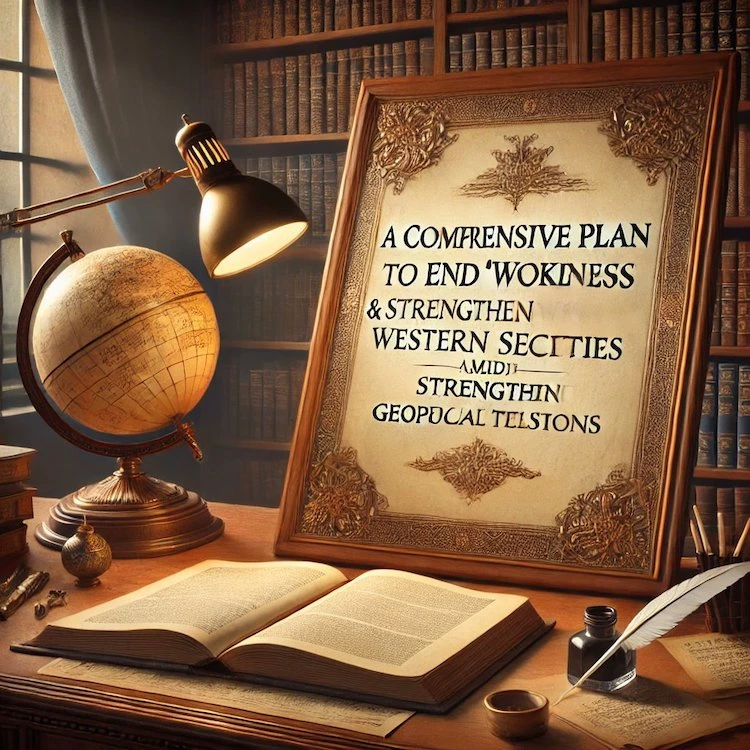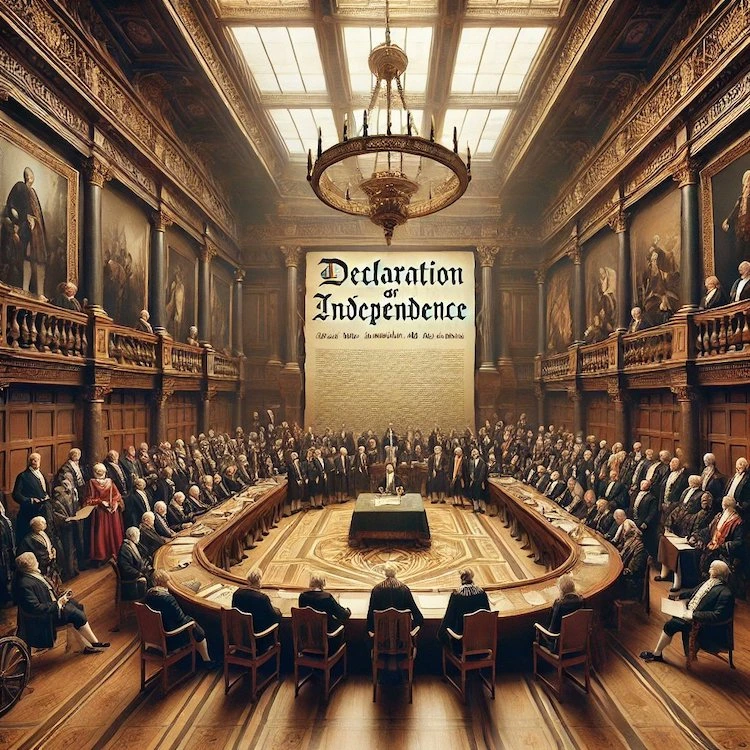Introduction
Elon Musk has expressed the idea that engineers and technologists should focus on solving the most important and impactful problems. He has emphasized that it’s not enough to be technically skilled or innovative if the problems being addressed are not significant or relevant. Musk often talks about the importance of working on projects that contribute to the betterment of humanity, such as sustainable energy, space exploration, and artificial intelligence safety. His perspective is that engineers should prioritize their efforts on solving critical challenges rather than just advancing technology for its own sake.
DogeDesigner @cb_doge a well known accomplice of Elon, said in a recent X post: “How can we end wokeness in people?”
This must be the critical problem to humanity that Elon is referring to. As such, this article is the initial brainstorming session to this interesting challenge.
Proposal:
As Western Europe, America, and Canada face rising geopolitical tensions with China and Russia, addressing the cultural and ideological challenges posed by “wokeness” becomes crucial. This comprehensive plan integrates educational reforms, cultural preservation, and a focus on individual responsibility, aiming to foster a resilient and united society. By protecting free speech, enhancing STEM education, supporting traditional values, and addressing geopolitical realities, we can strengthen Western societies and ensure their future prosperity.
Action Steps:
1. Protect Free Speech and Diverse Opinions
- Upholding Free Speech: Ensure that free speech rights are upheld, allowing for diverse perspectives, including critiques of “wokeness.” Open dialogue is essential for democratic societies to thrive, fostering an environment where all voices can be heard.
- Expanding on the Dangers of Censorship: The creeping censorship we see today, both in the real world and online, is more than just an attack on individuals; it’s a direct assault on the very foundation of Western civilization. It mirrors the suffocating tactics of regimes like Ceaușescu’s Romania, where dissent was met with swift and brutal silencing. When governments and institutions decide which opinions are acceptable and which are punishable, they take the first step towards tyranny. Freedom of speech isn’t just a nice-to-have; it’s the lifeblood of a free society, allowing for the open exchange of ideas, the challenging of narratives, and the peaceful resolution of conflicts.
- Combating “Cancel Culture”: “Cancel culture,” with its “swift judgments” and “social media mob mentality“, has created a climate of fear where individuals are afraid to express their true thoughts and beliefs. This stifles creativity, innovation, and critical thinking. We must actively combat this by fostering “a culture of tolerance and understanding“, where “open dialogue is encouraged, even on controversial topics“. Universities, once bastions of intellectual freedom, have become “increasingly ideologically homogenous”. This stifles the very purpose of higher education – to challenge assumptions, explore diverse perspectives, and cultivate independent thinkers. We need to promote intellectual diversity on campuses and encourage respectful debate, even on challenging issues.
2. Open Source and Transparent Online Education
- Promoting Academic Rigour: Utilize platforms like EdX, Coursera, and SGT to offer education focused on academic rigour rather than ideological bias. Transparency in curricula (full lessons published online for review by experts on the internet), educational content made openly available online for public review, ensures adherence to quality lesson delivery, where students can focus on education and not indoctrination and rhetoric, and this helps individuals develop critical thinking and evidence-based learning skills.
- Exposing Ideological Bias: Over the past few decades, a subtle but insidious shift has occurred in our educational systems. The emphasis on critical thinking and evidence-based reasoning has been replaced, in many instances, with “the promotion of specific ideologies”. These ideologies, often presented as unquestionable truths, are seeping into curricula, shaping young minds in ways that “undermine traditional values and a balanced understanding of history“. Students are being taught what to think, rather than how to think.
- The Need for Open-Source Education: Open-source educational platforms offer a powerful antidote to this ideological capture. By making curricula and educational content publicly accessible, we can ensure transparency and accountability. This will allow parents, educators, and concerned citizens to scrutinize materials and ensure they are free from bias and promote genuine learning. This approach empowers individuals to engage in critical analysis, compare different perspectives, and form their own informed opinions.
3. Double the Graduation Rates of STEM Professionals
- Enhancing and Widening the Logical Foundations of Society: Western nations can double the graduation rates of STEM professionals relative to all graduate types, to disseminate their logical and structured thinking observations, perspectives and processes with social communications and professional communications throughout society. This social network effect spreads common sense, applied analysis, grounded, practical, and technical thinking, essential for a coherent and functional society.
- The Power of STEM: As technology accelerates and the challenges facing humanity grow increasingly complex, a strong foundation in STEM is more crucial than ever. The ability to think logically, analyze data, solve problems, and innovate is essential, not only for individuals but for the well-being of our societies. STEM professionals are the builders, innovators, and problem-solvers who drive progress and create a better future. It will also enhance analytical skills and perception, improving humanity’s ability to identify and counteract deceptive AI agents.
- Addressing the STEM Skills Gap: It’s alarming that, despite the critical need for STEM expertise, graduation rates in these fields are lagging behind, far behind the STEM graduate production rates in China and Russia in any of the western nations. This shortage significantly contributes to the economic, technological, and societal challenges we encounter, including the inability of Western countries to effectively engage with 21st-century economic systems on a productive and efficient basis. We need to prioritize STEM education at all levels, provide ample funding for applied research, development and applied real world projects, and create attractive career paths for talented individuals. Without a robust STEM workforce, we risk falling behind in the global race for innovation and facing a future where we are unable to solve our own problems.
4. Guardianship of Culture and History
- Preserving Cultural Heritage: Emphasize understanding history, including both achievements and mistakes (not just national history, but America and European history too, including Eastern European history useful to know about in 21st century context), to foster a balanced perspective. Highlight the value of Western cultural heritage (the history of United States, Italy, France and United Kingdom, not just that of Germany.. and not stressing only WW1 and WW2, but the positive aspects of civilizations and empires) and the contributions of reasoning and republican philosophy to modern western societies. Put a stop to the attack and the consequent decline, and the attack on Christianity (No matter who is doing it, corporations or nation states. Find a way to stop them in their tracks and for good.), to maintain a foundational cultural bond within communities; such as the guardianship of Canadian Christian identity which has decreased to 52% in 2021, down from 83% in 1990 and 87% in 1980. This may involve lowering the immigration rates of cultures that are against Christianity, if only to reduce alliance partners for any woke forces that might seek to decrease the moral and spiritual value of society that is embedded within Christian beliefs and/or Christian family founded families. Putting a stop to decay of Christian families, will lock in morality component, and make it easier to rebuild the other components of society that may desire continued moral decay.
- The Attack on Western Heritage: The ongoing assault on Western cultural heritage, manifested in the tearing down of statues, the rewriting of history, and the demonization of traditional values, is a dangerous trend that must be stopped. This revisionist approach to history seeks to erase our achievements, amplify our mistakes, and undermine the very foundations of our civilization. It leaves us with a fragmented and distorted understanding of our past, hindering our ability to learn from it and build a better future.
- The Importance of Christianity: The Judeo-Christian tradition has been a cornerstone of Western civilization for centuries. It provided a moral framework, inspired great works of art and literature, and fostered a culture of compassion and justice. To dismiss or demonize this heritage is to sever ourselves from our roots and weaken the very values that have made Western societies successful. We must acknowledge and celebrate the positive contributions of Christianity while also addressing historical injustices committed in its name.
5. Promote Individual Responsibility, Meritocracy, and Competence
- Focus on Merit and Responsibility: Shift focus from group identity to individual merit, competence, performance, competition, autonomy, sovereignty, independence and responsibility. Implement structured hiring processes using technology benchmarks (such as National Technology Benchmarks used at Engineering Technology boards for certification in Canada), professional designations as references instead of personal references used by unstructured hiring HR personnel, and tech corporate designed technology competency models/benchmarks/tests, ensuring fairness and transparency in professional opportunities. Tests are essential to guard against those that create fake portfoios with AI systems. Prioritize verifiable portfolios and professional qualifications over unstructured interviews from current HR administrative staff, and reference letters (that are not even professors signing these references but random people on the street that the HR person will never meet). Hire technicians, technologists, engineers and scientists to do the HR function instead of administrative staff, and hire these individuals in management roles in private corporations and public agencies.
- The Erosion of Meritocracy: The obsession with group identity and “equity” has led to a dangerous erosion of meritocracy. Instead of rewarding hard work, talent, and competence, we are increasingly seeing a focus on quotas, diversity targets, and subjective criteria as to why something is relevant, such as skin colour or gender. This creates an uneven playing field, demoralizes individuals who are judged based on their group affiliation, their psychological predisposition, their political affiliation, their personality type, rather than their merits, their talents, their work ethic,and ultimately leads to a decline in excellence, innovation, productive output of corporations and lowered labour force participation.
- Building a Fair and Transparent System: We must return to a system where individuals are judged based on their skills, qualifications, and the value they bring to the table. This requires implementing structured hiring processes that prioritize verifiable achievements and measurable competence over subjective evaluations and personal connections. We need to empower individuals to succeed based on their own merits, not on their group identity. This will create a more just and dynamic society where everyone has the opportunity to thrive.
6. Support for Traditional Values and Institutions
- Strengthening Stability: Reinforcing traditional institutions such as family and community organizations is crucial for providing stability and a sense of identity. These pillars of society play a vital role in fostering strong community ties and preserving cultural heritage. By bolstering these foundational structures, we create supportive environments that enhance individual connection and societal well-being. This base is essential for nurturing a sense of belonging and purpose, which, in turn, promotes civic engagement and community resilience.
- To address the erosion of Canadian Christian identity, it is imperative to protect and revitalize this community to stem, and ideally reverse, the moral decline observed in Western nations. Additionally, the preservation and revitalization of rural farming communities are essential. These communities are not only custodians of life-sustaining systems and human connections to the land but also play a critical role in maintaining the biological robustness of humans, safeguarding species fertility, and potentially restoring the moral and communal fabric of society.
- Promote balanced urban and rural development to encourage the growth of new towns and villages. This strategy helps reduce overpopulation in cities, mega city dystopian sci-fi slums predicted in films like Judge Dredd, which can lead to strained resources and infrastructure and infrastructure collapse as early as 2050. By supporting rural areas, we also promote a closer connection to the land and nature, which is integral to human well-being. Farmers and agricultural communities play a crucial role in this context. They not only provide food security but also embody values of hard work, self-sufficiency, and stewardship of the environment. These communities are often characterized by a deep respect for the cycles of life and nature, which is reflected in their way of life and their commitment to nurturing both crops and the next generation.
- The philosophy of procreation and family-building is intrinsically linked to farming communities. In these settings, families are often larger, and children grow up with a strong understanding of the importance of work, responsibility, and the natural world. This environment fosters a value system that prioritizes life, continuity, and the nurturing of future generations. It contrasts sharply with more urban-centric philosophies that may prioritize individualism over communal responsibility, and the supremacy of technology over humanity (Team AI instead of Team Human). By promoting policies that support farming and rural lifestyles, we can encourage a pro-natalist culture that values the creation and nurturing of life. (Team Human foundations here). This not only helps address demographic challenges but also reinforces the cultural and philosophical foundations that sustain a healthy, thriving society.
- (In addition, it is not only the idea of putting an end to woke culture that is relevant to this discussion, but the correlation of urban environments to fertility drop might be higher than that of rural environment to fertility drop. As such, it would be wise to prevent a loss and shrinkage of the rural environment setting for humanity. Given that the goal is to protect fertility levels globally, we must not exacerbate the situation by boosting immigration levels to Canadian urban mega cities, into fertility decreasing, birth suppressing, mega city structures by taking the world’s farmers from their self sustaining habitats where large families are possible without debts and without mortgages.
7. Ban Mass Media Systems and State Funded Media Systems
- Ending Government Influence and Subsidies in Media: To ensure balanced and fair media coverage, it is essential to eliminate government subsidies that control public behaviour through media networks. This involves stopping government funding for media outlets, which can lead to biased reporting and serve specific political agendas for tyrants which increasingly are seeking global control and the integration of global legislation into national frameworks which do not originate with citizens, but come from top down billionaires and un-elected elites from unknown international-level private institutions. By cutting these financial ties to state media like CBC in Canada, we can reduce the influence of government on media content, promoting a more independent and unbiased press, thus reducing conditioning of the public to government objectives. This independence is crucial for maintaining a healthy democracy where diverse opinions, and clear headed perception exists, and critical discussions can flourish.
- Banning Mass Media Systems and Preventing Ideological Manipulation: One of the critical measures to prevent media manipulation is to ban mass media systems capable of disseminating a single message to hundreds of thousands of outlets simultaneously. This practice can create a form of mass media hypnosis (like we saw in 2020 to 2024), where large segments of the population are influenced by a uniform message, often driven by corporate or political interests. By banning these systems, we can prevent the creation of ideological movements orchestrated through coordinated corporate advertising. This ensures that media messages are not artificially amplified to manipulate public perception on a large scale.
- Encouraging Diverse and Critical Media Reporting: To counter the effects of “mass dissemination systems” — which can manipulate public perception and belief structure through the coordinated use of over 100,000 media agents spreading messages across multiple networks in synchrony with the same written with the same words or synonym words — it’s crucial to promote media reporting that presents multiple perspectives on issues, and each media agent delivers a unique message originated by their own creation and not tied to other media agents.
- Challenge powerful billionaires and ban mass media systems, as they can allow investors to hijack an entire nation’s media apparatus at once — a type of “truth hijacking” that can lead to “group madness” and “group chaos.” Paying one media outlet to deliver a message differs significantly from paying an entire network system. When a message is broadcast through 100,000 media systems, it transforms into propaganda, a form of warfare and hypnosis that impairs critical thinking and creates mental “conditioning blocks” in the population, preventing them from perceiving the world accurately.
- This approach helps avoid sensationalism and bias, fostering a more nuanced and comprehensive understanding of complex subjects. Media outlets should commit to responsible journalism that prioritizes accurate reporting and embraces diverse viewpoints. By nurturing a media landscape that values critical inquiry and a diversity of opinions, we can prevent mass media or state-funded media from becoming tools for ideological indoctrination and ensure a well-informed public.
8. Encourage Civic Engagement and Active Citizenship
- Encouraging Community Engagement and Service: Promoting active participation in civic life begins with encouraging community service, which aligns with the Christian values of charity, compassion, and stewardship. By fostering a culture where individuals are motivated to help their neighbours, support local initiatives, and contribute to the welfare of their communities, we build stronger, more resilient societies. Community service not only helps to address local needs but also instills a sense of purpose and responsibility. This engagement, rooted in Christian principles of loving one’s neighbour, strengthens community bonds and promotes a sense of unity and shared purpose.
- Fostering Participation in Local Politics and Upholding Christian Principles: Encouraging participation in local politics is crucial for ensuring that Christian values and ethical standards are represented in governance. Engaging in local politics, whether through voting, attending meetings, or running for office, provides a platform for advocating policies that align with Christian teachings on justice, compassion, and moral integrity. By being actively involved, Christians can help shape a political landscape that respects human dignity and promotes the common good. This involvement also ensures that decision-making processes are transparent and accountable, reflecting the moral and ethical considerations important to Christian communities.
- Creating Spaces for Public Discourse and Christian Dialogue: Creating spaces for public discourse and interaction is essential for fostering understanding and reducing societal divisions. Christian communities can play a pivotal role by providing forums for open and respectful dialogue, where diverse perspectives can be shared and discussed in the light of Christian teachings. Churches and Christian organizations can host discussions on key societal issues, offering a platform for bridging differences and promoting reconciliation. These spaces encourage constructive debate, reduce the appeal of extremist ideologies, and strengthen social cohesion by fostering a culture of empathy and mutual respect. By grounding public discourse in Christian values of love, humility, and truth, we can work towards a more compassionate and just society.
9. End the War on Agriculture, Energy, and Mining
- Ending the War on Agriculture, Energy, and Mining: Vital for Community and Identity: The sectors of agriculture, energy, and mining are not merely economic drivers; they are foundational to the cultural and community bonds that tie people to the land and to each other. The current “war” on these industries, characterized by restrictive regulations and negative public narratives, threatens to sever these connections. Agriculture, in particular, is a way of life that fosters deep respect for nature, sustainability, and the cycles of life. Farmers and miners alike have long been custodians of the land, managing its resources responsibly and providing for their communities. Recognizing the importance of these sectors is crucial for preserving a balanced relationship between humanity and nature, one that respects the intrinsic value of the land and the people who work it.
- Enhancing Decentralized Farming Cultures and Urban Greenhouses: Promoting decentralized farming cultures and the establishment of greenhouses near urban areas offers a practical solution to counter the homogenizing influences of “woke” culture, which often promotes ideological conformity at the expense of traditional values. Decentralized farming not only increases food security but also encourages local economies and reduces the environmental impact and reduces the danger to living beings in case of long supply chains or interrupted supply chains. Urban greenhouses can serve as educational hubs, teaching city dwellers about sustainable agriculture and reconnecting them with the source of their food. This approach supports a more self-sufficient and resilient society, where individuals are more closely connected to the land and to each other, fostering a deeper appreciation for the natural world and the labour that sustains it.
- Farmers as Custodians of Traditional Values: Farmers, by the very nature of their work, embody a philosophy that is fundamentally life-affirming and protective. They cultivate the land, nourish communities, and pass on vital knowledge and traditions that have been honed over generations. This stands in stark contrast to certain aspects of “woke” culture, which often seeks to deconstruct traditional values and undermine established norms. By valuing and supporting the agricultural sector, society can reaffirm its commitment to the principles of stewardship, sustainability, and community solidarity. Farmers, with their focus on practical skills and hands-on knowledge, play a crucial role in preserving cultural heritage and promoting a way of life that honours the inter-connectedness of all living things. In this way, they serve as a bulwark against the erosion of traditional values and the alienation that can result from the loss of cultural identity.
10. Strengthening National Sovereignty Through Practical Measures
- Promoting Agricultural Self-Sufficiency: A key aspect of strengthening national sovereignty is promoting agricultural self-sufficiency. By supporting and expanding local farming practices, including the development of decentralized farming cultures and greenhouses, Canada can reduce its reliance on foreign food imports. This not only ensures food security but also enhances the resilience of local communities, especially necessary as the dangers of the “Great Filter” are forecasted to emerge from 2020 to 2050. Farmers and agricultural workers, with their deep connections to the land, play a vital role in maintaining the country’s sovereignty and improving AI Safety by maintaining their kingdom and land sovereignty, their self defense rights, free from AI control from city administrators (which will seek to dominate the strata condo holders first as part of AI wired control). The freehold farmers embody a philosophy of self-reliance and sustainability, which is crucial for any nation’s independence and stability, especially in the “age of AI”, the “Tech Singularity” and the “Great Filter Singularity“.
- Enhancing Energy Independence: In addition to agriculture, energy independence is a critical component of national sovereignty. Canada has vast natural resources, including oil, natural gas, and renewable energy sources like hydroelectric and wind power. By investing in these resources and developing infrastructure to support domestic energy production, Canada can reduce its dependency on foreign energy imports. This not only strengthens the country’s economic stability but also ensures that it can maintain autonomy in its energy policies and practices. A strong domestic energy sector also creates jobs and supports technological innovation, further bolstering national sovereignty.
- Supporting Local Industries and Reducing Foreign Dependence: Supporting local industries, including mining and manufacturing, is another essential aspect of strengthening national sovereignty. By fostering a robust domestic industrial base, Canada can produce the goods and materials needed for its economy, reducing dependence on foreign sources. This includes critical sectors such as technology, pharmaceuticals, and essential goods production. Encouraging innovation and investment in these industries can lead to greater self-sufficiency and resilience in the face of global disruptions. Policies that support local businesses and prioritize Canadian-made products contribute to a stronger, more sovereign nation.
- By focusing on these practical measures — agricultural self-sufficiency, energy independence, and supporting local industries — Canada can enhance its national sovereignty in meaningful and tangible ways. These actions ensure that the country remains resilient, self-reliant, and capable of making independent decisions that reflect the interests and values of its citizens.
11. Policy and Legal Frameworks
- Protecting Individual Rights: Implement laws that protect individual rights and freedoms while preventing ideological imposition in public institutions and workplaces. Establish safeguards at local and national levels to protect against extremism and ensure accountability.
- The Rise of Authoritarianism: It’s alarming to witness the steady erosion of individual rights in Western democracies. Governments are increasingly enacting legislation that restricts free speech, limits religious freedom, and infringes on personal liberties. This is often done under the guise of combating “hate speech,” promoting “safety,” or advancing “social justice.” However, these measures often serve to “silence dissent”, punish those who hold “unpopular views“, and empower a “growing authoritarian state”.
- Protecting Individual Liberties: We must be vigilant in defending our fundamental freedoms and pushing back against these encroaching powers. A strong and independent judiciary is crucial to upholding the rule of law and ensuring that government actions are held accountable. We also need to promote “a culture of respect for individual rights, even those we disagree with.”
12. Promote National Unity and Shared Identity
- Fostering National Identity: Encourage a shared national identity that transcends political and ideological divides. Emphasize common goals and values, such as democracy, freedom, unity and human rights. Promote movements that foster unity, recognizing that a strong, cohesive society is vital for thriving cultures and nations. Ex: United for a Strong America, United For Freedom (Canada)
- The Balkanization of Society: The relentless focus on identity politics has led to a dangerous fragmentation of Western societies. Instead of seeing ourselves as citizens of a shared nation, we are increasingly divided along racial, ethnic, religious, and ideological lines. This “balkanization” weakens social cohesion, undermines trust in institutions, and creates a climate of perpetual conflict.
- Building a Unified Future: To forge a robust national unity, we must rekindle our shared values and cultivate a sense of collective purpose. While diversity enriches our societies, it is unity that truly strengthens them. This requires a renewed emphasis on the principles of individual liberty, equality under the law, and democratic governance. We need to celebrate our shared history and culture, recognize the contributions of all citizens, and collaboratively tackle the challenges that our nations face.
- A unified society is a resilient society, equipped to withstand the challenges of the 21st century. Unity forms the bedrock of Western society — evident in the teamwork of our workplaces, the sportsmanship displayed in the Olympics, the “leave no man behind” philosophy of our Armed Forces, and the communal spirit of our churches and emergency responses. It is a pervasive ethos, yet we often overlook it, overshadowed by a focus on diversity.
- What truly binds us — our families, communities, nations, and our connection to the land — unites us in pursuit of common goals: our well-being, the well-being of others, and collective progress. It’s time to bring unity back into our conversations and actions, recognizing it as the core strength of our society.
Conclusion: A Call to Action for a Renaissance of Reason and Strength
The erosion of Western values, the rise of “wokeness,” and the looming geopolitical threats paint a stark picture of the challenges we face. But amidst these shadows, a glimmer of hope remains. By embracing the principles outlined in this plan, we can ignite a renaissance of reason, strength, and unity.
This is not a time for complacency or despair. It’s a time for courageous action, for standing firm in defense of our hard-won freedoms, and for reclaiming the values that have made Western civilization a beacon of hope for the world.
We must empower individuals, strengthen families, restore trust in institutions, and foster a renewed sense of national pride. We must unleash the power of STEM, celebrate our cultural heritage, and promote a meritocratic society where everyone has the opportunity to thrive based on their own merits.
Let us not succumb to the siren song of “wokeness” with its divisive ideologies and empty promises. Let us instead embrace a future grounded in reason, individual responsibility, and a shared commitment to the well-being of our nations. The fate of Western civilization hangs in the balance. The time to act is now!
Related Content:








United for Freedom!

United for a Strong America!
To see our Donate Page, click https://skillsgaptrainer.com/donate
To see our Instagram Channel, click https://www.instagram.com/skillsgaptrainer/
To see some of our Udemy Courses, click SGT Udemy Page
To see our YouTube Channel, click https://www.youtube.com/@skillsgaptrainer